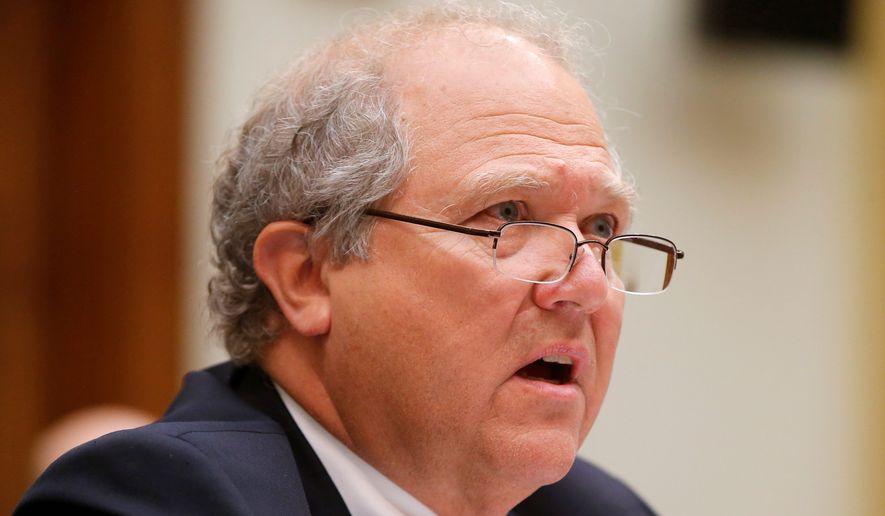A top military commander has moved to classify data that previously let a federal watchdog track the billions the U.S. government is spending on Afghanistan’s security forces, leaving investigators incapable of accounting for taxpayer funds for the first time in six years.
John Sopko, the Special Inspector General for Afghanistan Reconstruction (SIGAR), is calling the action “unprecedented.”
In a 248-page quarterly report to Congress, Mr. Sopko, a persistent critic of the U.S. reconstruction effort in Afghanistan, described how Army Gen. John Campbell decided to classify previously public data on the Afghan National Security Forces as “secret” and “confidential.”
Gen. Campbell, who oversees the NATO-led international security mission now known as Resolute Support, has made it impossible for the federal watchdog to ensure that U.S. dollars are not being misspent on training those forces, providing them with military equipment, building infrastructure for them, and ensuring anticorruption measures are in place, Mr. Sopko said in the Jan. 30 report.
Mr. Sopko began ringing the alarm bells in October 2014 about Gen. Campbell’s abrupt decision to conceal details about Afghan army and police capabilities. Those concerns were compounded two months later when Gen. Campbell issued a directive to retroactively conceal from taxpayers additional information on activity in Afghanistan, Mr. Sopko said.
“Every quarter SIGAR sends out a request for data to U.S. implementing agencies in Afghanistan with a list of questions about their programs,” he said. “This quarter SIGAR received its data call responses from [U.S. Forces Afghanistan] in the usual unclassified format on December 29, 2014. Five days later, SIGAR received an email stating that [Resolute Support Mission] planned to retroactively classify many of the responses.”
SEE ALSO: Military commission recommends cuts to pension, private health insurance
On Jan. 16, the federal watchdog received an update from Gen. Campbell’s staff stating that it could make public only three of the responses and keep secret the remaining data.
In a Jan. 18 memo, Gen. Campbell revealed to Mr. Sopko that he is making the data secret in order to protect troops operating inside the country.
The memo, obtained by The Washington Times, shows that the military leader is concerned about the Taliban and other terror groups using that information to exploit the weaknesses of those forces and international troops working in the country.
“I can advise that given risks that continue to exist to our forces and those in Afghanistan, I have directed that sensitive operational information or related materials, that could be used by those who threaten the force, or Afghan forces, be classified at an appropriate level,” he said. “With lives literally on the line, I am sure that you can join me in recognizing that we must be careful to avoid providing sensitive information to those that threaten our forces and Afghan forces, particularly information that can be used by such opposing forces to sharpen their attacks.”
Army Lt. Col. Chris Belcher, spokesman for NATO’s International Security Assistance Force in Afghanistan, said in a statement Wednesday that Gen. Campbell decided to take action after the Afghan government urged him to protect information on that might reveal to adversaries whether Afghan security forces have been properly trained and equipped or experiencing difficulties in combat situations.
“We appreciate, understand and support SIGAR’s responsibility to provide information to Congress and the American public,” he said. “At the same time, we have a responsibility to protect data that could jeopardize the operational security of our Afghan partners to include unnecessarily highlighting possible vulnerabilities and capability gaps; information which could provide adversaries critical intelligence that could be exploited endangering the lives of our Afghan partners and the coalition forces serving alongside them. Just as we classify our own armed forces readiness reports for security purposes, it is prudent for us as a reliable security partner to do the same for Afghan National Security Forces.”
SEE ALSO: Obama amnesty would save feds $7.5 billion: CBO study
SIGAR did not immediately respond to a request for comment on whether Gen. Campbell’s justification for concealing from the public the use of taxpayer funds was valid.
• Maggie Ybarra can be reached at mybarra@washingtontimes.com.




Please read our comment policy before commenting.